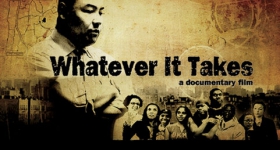Let's hope neither half of this Asian couple is Korean. Just kidding, y'all.
Photo by Bill Branson, Wikimedia Commons.
The April 22
episode of Anthony Bourdain’s new travel series Parts
Unknown turned its cameras on L.A.’s Koreatown and included a visit with subversive
contemporary artist David Choe. Bourdain asked Choe to clarify one
particular nugget of advice he offers to those wanting to find success in life:
“Whatever you do, don’t date a Korean girl.”
Choe’s response somehow managed to fuse the reductionist sentiment from both sides of the hetero Asian
American interracial dating debate that still manages to set the Internet
ablaze (even in try-hard, XO
Jane fashion):
“Well,
I’m racist. For me, I’ve given it a shot. And then I end up in a situation
where I feel like I’m dating my mom. … [Korean women are] overbearing; jealous;
unreasonable; like, unrealistic about life; demanding. … But also the men too.
If you’re a woman, I would never recommend dating a Korean guy.”
Though he scrutinizes Korean women through a generalized lens, Choe openly admits his racial insensitivity and includes himself among this mass of unsuitable Koreans (the 2010 documentary of his life and career, Dirty Hands, would
also support this) which makes me think his comments signify more than just a dude throwing shade at Korean chicks.
Many of us know, or are perhaps inured to, the trope of the “crazy” Korean
significant other, a simplistic dichotomy of hard-drinking,
abusive men and domineering, psychotic women. Both Korean and Asian America seems to embrace -- or at
least, tacitly corroborate -- this stereotype. It’s strangely become a part of our collective
cultural performance, like joking about who’s the cheapest or who takes the
most photos of their food ... but, you know, with a profound sense of emotional brokenness and damage. Let's put it this way: I would rather bear the ethnic stereotype of writing too many Yelp reviews than of being completely unhinged. I don't care how beloved My Sassy Girl is.
I asked a few
Korean Americans to elaborate on their “unmarriageable” status as professed by Choe. Aside from a universal sense of self-deprecation and wryness at an all too familiar topic, some responses specifically alluded to the personalities and
relationships of their parents’ generation:
“It
feels great because now I can tell my mom that it's not my fault after all!
It's just because I'm Korean American. So, it's your fault, mom. Your fault.” --C.K.
“My Korean father refused to marry my Korean mother, and
abandoned her, pregnant and alone. I was sent away from the motherland, to be
raised strangers abroad. But yeah, sure. That sounds great. It's not like I've
spent my entire life trying to prove I'm unmarriageable and unloveable.” --K.D.
"If
I'm anything like my mother, I completely understand why a man would hesitate
to marry me." --V.L.
One
took a more inward approach:
“Nobody should marry Koreans because we're fucking crazy. All jokes aside, I think Koreans
-- and non-Koreans -- try to find an excuse [about] what is so flawed about
ourselves that we use labels like ‘stalker,’ ‘crazy,’ ‘princess,’ ‘possessive,’
and the like.” --E.H.
And
finally, one recognized her own Korean intensity:
“I
know I'm difficult to deal with, I have a huge case of han, but my Japanese/American husband has put up with me for 11
years." --J.K.
And there it
is: han.
A lingering feeling of sadness, revenge, and resiliency that endures through
generations in Korea and abroad. Choe talks about han, too, explaining it to Tony Bourdain without a doubt
of its existence. “The han is the reason, like, we are who we are,” Choe says.
“But it’s also the same reason I won’t marry a Korean woman.” The brashness of his earlier scene is replaced with pensiveness, and I began to think that this conversation wasn't so much about who's desirable as a partner but why Choe and his fellow Korean Americans feel compelled to broadcast these feelings at our own expense. I was just under the assumption that bad jokes die hard; but could we actually be clinging to this image and the emotional trappings that may come with it -- because of han?
We’ve heard of
han in the context of the division of the Korean peninsula, the Korean
diaspora, and the Los Angeles riots, but perhaps not so much as a talking point
when it comes to this legacy as heinous life partners. It's not just about casting aspersions on the males and females we were raised with or whom we were involved with/actively avoided as adults. There's something that seems to lie just below the surface -- something we dislike about ourselves, memories of relationships we've seen or been in that we just can't shake -- that makes us wear this stereotype like a badge, whether we exhibit these hard ass traits or not.
There are obviously well-adjusted, happy, coupled up Koreans all around the world -- some of us may actually be those Koreans (!) -- yet it seems like more good ol' fashioned fun to collectively perpetuate this sense of craziness even if it means lumping ourselves together under the same unflattering light. Is it just part of our prized, dark cultural humor? Partially. But it may also be a manifestation of that han-induced suffering, stoked by the racism, gender inequality, economic struggle, and personal and family strife that often shape the immigrant and second generation experience. Whether we're romantically interested in other Koreans or not, this perception of each other as unfit for love, however hyperbolic or tongue-in-cheek, can't possibly be good for any of us. To echo my own response to hearing others' "crazy Korean ex" anecdotes: "We're not that bad."
That may sound like I'm setting the bar precariously low, but I like that it's a statement that signals a desire for growth. We can't forget that nestled next to the pain and internal struggle that comprise han are quite positive elements, like perseverence and hope. What would we be fighting for or why would we suffer so if love -- for oneself, for others, for country -- weren't at play? While Choe may espouse that he and the rest of Korean America are romantically doomed, the responses I gathered from my peers represent a more reflective and determined brand of these oh-so Korean feelings. J.K. went on to explain further:
"[W]hat really makes a marriage beautiful and worth it comes years
beyond the wedding day, when the two people learn to become
brothers-in-arms, working together to keep their families and their
communities happy and healthy. That's when being Korean comes in handy,
actually. We know how to fight for the survival of the family. We are
used to suffering for the higher good. And somehow, we have fun doing
it."
Yes, our han is born from the relationships that created us and yes, we project it onto others when we create relationships of our own. But with our tenacity, we can channel it into something caring, supportive, and not just a cloud of terror mixed with Marlboro Red exhaust. A lofty goal? Perhaps. But that's what keeps us rolling.










Comments